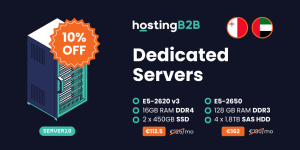
HostingB2B » Financial Services
Cloud for FinTech Ultra‑Low Latency Secure Compliant 24/7 Support
HostingB2B’s Cloud Solutions for Brokers, Traders, and Financial Services. Leverage fast and secure direct connectivity to major stock exchanges, including London LD3 and over 20 other Equinix data centers worldwide.

Key Benefits
High-Performance Servers
Utilize state-of-the-art Dell servers equipped with high-frequency Intel CPUs, housed in reliable Tier IV & III data centers.
Quick Deployment and Managed Kubernetes
Deploy Bare Metal servers in just 10 minutes with fully automated infrastructure.
Proximity to Major EMEA Financial Hubs
Our infrastructure is situated in Equinix’s LD3 data center in London, just 16 km from LD4, home to leading capital market participants. This ensures ultra-low 5 ms latency to a major EMEA stock exchange.
Direct Access to Global Markets
Achieve 5–10 ms latency with HostingB2B’s hardware deployed in over 25 Equinix data centers, including key locations like London, Paris, Amsterdam, Singapore, Tokyo, and Sydney. Average connection latency is under 10 ms.
SUPPORT & GUIDANCE
24/7/365 Free Premium Cloud for FinTech Hosting Support
Most importantly, our round the clock Support is available for you via Live Chat, Ticket System (Email) and MS Teams.



Who Can Benefit from HostingB2B’s Infrastructure?
HostingB2B provides a ready-made infrastructure with essential features for financial services and companies, including:
- Stockbrokers
- Traders
- Payment Operators
- Crypto Brokers
- Asset Management Companies
Powerful and Secure Infrastructure in Financial Centers
We offer robust infrastructure in key financial centers for hosting MetaTrader 4/5 platforms, ensuring ultra-low latency and high-speed processing. This setup allows your trading algorithms to respond swiftly to market fluctuations.
Performance Benefits:
- High-speed processing of trading operations.
- Optimal environment for automated, high-frequency trading, and scalping.
- Direct connectivity to major financial hubs such as London, Singapore, and Tokyo with 5–10 ms latency.
Security Benefits:
- Comprehensive protection against L3, L4, and L7 DDoS attacks.
- Compliance with GDPR, PCI DSS, and ISO/IEC 27001 standards.
- Resilient data centers rated Tier III and Tier IV.
FAQ
Find answers to some frequently asked questions about Financial Services:
In the FinTech industry, cloud computing refers to the on-demand provision of computer services to financial institutions and FinTech businesses via the internet, including servers, storage, databases, networking, software, analytics, and intelligence. Organizations use cloud providers to remotely access and manage IT resources rather than constructing and maintaining physical infrastructure on-site.
FinTech businesses can now use scalable, adaptable, and frequently more affordable infrastructure for their data analytics, fraud detection, payment processing, and sensitive financial applications thanks to this adoption. FinTech is undergoing a revolution thanks to cloud computing, which makes it possible for quicker innovation, better security, and increased operational efficiency.
An online subscription-based cloud-native financial software solution is known as a FinTech SaaS (Software as a Service) platform. Users use a web browser or mobile app to access the FinTech application directly, bypassing the need to install and maintain software locally. All of the underlying infrastructure, upkeep, security, and updates are managed by the FinTech SaaS provider.
Cloud-based lending platforms, payment gateways, tools for managing personal finances, and fraud detection software are a few examples. Financial institutions seeking to innovate without requiring substantial in-house IT development are drawn to FinTech SaaS platforms because of their many advantages, which include lower costs, quicker deployment, automatic updates, and improved scalability.
Cloud hosting solutions are services that offer offsite, virtualized servers and computer power to host data, apps, and websites. Cloud hosting disperses workloads among a network of linked virtual servers, creating a “cloud,” as opposed to traditional hosting, which ties resources to a single physical server.
This architecture provides a great deal of scalability, flexibility, and dependability. Redundancy across several servers guarantees high availability, and resources like CPU, RAM, and storage can be scaled up or down in response to demand. In order to satisfy the various performance and security needs of different industries, including financial services, HostingB2B provides comprehensive cloud hosting solutions, including Public, Private, and Hybrid Cloud options.
The FinTech sector powers its cutting-edge financial services with a wide range of specialized software. This comprises trading platforms, payment processing systems, core banking software, tools for managing personal finances, software for detecting and preventing fraud, and solutions for regulatory compliance. Many of these use APIs for smooth integration or are offered as Software as a Service (SaaS).
Beyond particular uses, FinTech also depends significantly on software for cybersecurity (encryption, threat intelligence), data analytics (Big Data tools, AI/ML platforms), and customer relationship management (CRM). They are frequently developed using databases like SQL and NoSQL and programming languages like Python, Java, C++, and Node.js.
Indeed, a sizable and quickly expanding segment of the FinTech sector uses the Software as a Service (SaaS) business model. Numerous FinTech businesses create and provide their financial solutions as subscription-based cloud-based apps. This covers everything from platforms for lending and payment processing to investment tools and budgeting applications.
The SaaS model enables financial institutions to embrace new technologies without significant upfront infrastructure investments or drawn-out development cycles, which is ideal for FinTech’s requirements for agility, scalability, and cost-efficiency. The enormous growth and broad acceptance of FinTech solutions in the larger financial services sector have been made possible in large part by SaaS.
Within cloud computing, SaaS (Software as a Service) and cloud hosting are two different but related ideas.
- The term “cloud hosting” describes the underlying infrastructure—servers, storage, and networking—that is essentially made available online. Applications run on this platform. Installing, maintaining, and managing the operating system, apps, and data on your virtual servers is typically your responsibility when using cloud hosting. Platform as a Service (PaaS) or Infrastructure as a Service (IaaS) are two possible options.
- Software as a Service, or SaaS, is a fully functional software program that is managed by the service provider and is made available online. Without having to handle any of the underlying software or infrastructure, users can easily access and utilize the software (such as Salesforce, Microsoft 365, or a FinTech payment platform) through a web browser. SaaS is an end-user application that runs on cloud hosting.
Yes, FinTech makes extensive use of SQL (Structured Query Language), especially for applications that need dependable data consistency, structured data management, and strong transactional integrity. The foundation for core banking systems, payment processing, customer relationship management (CRM), and financial reporting continues to be traditional relational databases (such as MySQL, PostgreSQL, Oracle, and SQL Server) that use SQL.
The ACID (Atomicity, Consistency, Isolation, Durability) compliance provided by SQL databases is essential for guaranteeing the precision and integrity of financial transactions. SQL databases remain essential for the most crucial, consistency-demanding parts of financial operations, even though NoSQL databases are becoming more popular for managing unstructured data and having high scalability in specific FinTech domains like fraud detection or real-time analytics.
There is no one “best” programming language for FinTech because the best option varies depending on the needs of the particular application. Nonetheless, a number of languages are very common:
- Python: Because of its many libraries and user-friendliness, Python is widely used for data analytics, machine learning (AI-powered risk modeling, fraud detection), algorithmic trading, and rapid prototyping.
- Java: Because of its robustness, scalability, and robust security features, Java is a great option for large-scale, high-performance transactional systems, secure payment systems, and enterprise-level banking applications.
- High-frequency trading (HFT) systems and ultra-low latency applications where speed and direct hardware control are critical are best suited for C++.
- js: Great for creating real-time apps and scalable backend services, like peer-to-peer payment systems and digital wallets.Financial dataset management and querying require the use of SQL and related database languages.
Financial institutions can now process and analyze large, complicated datasets to obtain actionable insights thanks to big data, which is transforming the fintech industry. Important applications include:
- Fraud detection and prevention involves examining transaction data and behavioral patterns in real time to spot and flag questionable activity right away.
- Risk management is the process of more precisely evaluating credit risk, market risk, and operational risk through the examination of large amounts of historical data, social media trends, and other data sources.
- Personalized Customer Experiences: Developing highly tailored financial services, products, and advice according to each customer’s spending patterns, financial objectives, and preferences.
- High-frequency trading strategies are powered by algorithmic trading, which analyzes market data quickly.
- Regulatory Compliance: Supporting Know Your Customer (KYC) and Anti-Money Laundering (AML) procedures by effectively evaluating vast amounts of customer data.
FinTech can go beyond conventional models to more proactive and predictive operations thanks to big data, which is frequently processed on scalable cloud infrastructure from companies like HostingB2B.
The term “cloud” in financial services describes how banks, FinTech businesses, and other financial institutions are using cloud computing models to host their IT infrastructure, data, and applications. Financial organizations use the cloud for internet-based services like servers, storage, databases, analytics, and software applications rather than depending only on conventional on-premise data centers.
Because of this change, financial services can now take advantage of increased scalability, flexibility in responding to changes in the market, improved operational efficiency, and frequently lower costs. It is crucial that cloud solutions for finance adhere to strict privacy, data security, and regulatory compliance standards (like GDPR and PCI DSS), all of which top cloud providers like HostingB2B incorporate into their products.
Powering the Web: Our Latest Articles


HostingB2B becomes Silver Partner of 3CX

A 10% Discount on Dedicated Servers in Malta and Dubai

HostingB2B becomes Member of CITEA Community
How To: Unlock the Power of Web Solutions

Zero-Risk OS Upgrade with HostingB2B

SSL Certificate Renewal (DNS Re-Issue Required)

How to Host Your Platform in Malta with Zero Downtime Migration

How to Migrate to a Compliance-Ready Dedicated Server with Zero Downtime
- Stratigou Timagia Avenue 18, Omega Business Center 2nd Floor, 6047, Larnaca/Cyprus
- +357 24 205888
- admin[at]hostingb2b.com
- sales[at]hostingb2b.com
HOSTING
SOLUTIONS


Security
Application Hosting
Solutions as a Service
Networking
Datacenter & Network Information
Company Blog
Legal
Company Info
- About Us
- Certification & Awards
- Investor Relations
- Contact Us
Careers & Affiliates
Contact Info
- +357 24 205888
- +357 96 881688
- admin[at]hostingb2b.com
- sales[at]hostingb2b.com

"Their dedication to ensuring customer satisfaction is evident. Its comforting to know that there's an responsive support team available, for assistance. Without hesitation I highly recommend Hosting B2B Cyprus for their service well as the exceptional support offered by George Sarris. Thank you for making our hosting experience a positive one."
"I have used these chaps for about a year now, and their response times and knowledge of their services is really excellent. The most recent time I needed to contact them was around adding in a temporary server just for a few days - they were so helpful and quick to respond. Just what I wish so many other companies would do (take note, AWS!!!)"
"Great company! It was especially pleasant to work services sales, who made every effort to get everything we needed on time and get a positive result in the end. Not everything went smoothly at the beginning, but Marina S. did her best to solve the initial problems. After a few months, I can say that I'm definitely satisfied."